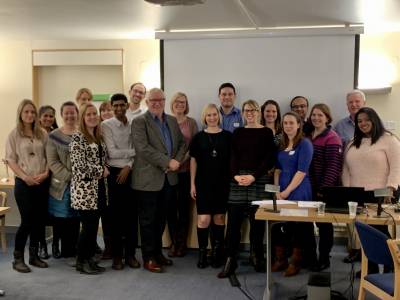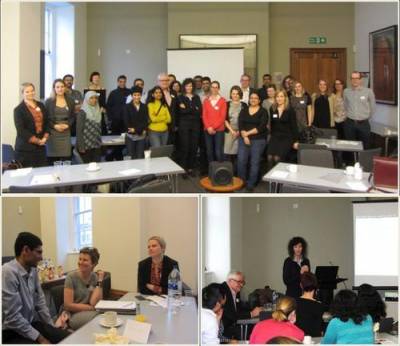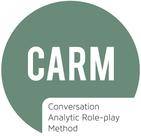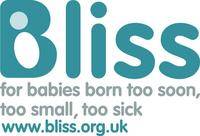January 2020: Two-day workshop on advanced communication skills in neonatal decision making

On 27th and 28th January, the Parents and Neonatal Decisions (PND) research team, together with Sands (the Stillborn and Neonatal Death Society), piloted a two-day, advanced communication skills workshop on neonatal end-of-life decision making. The workshop took place at the Queens Medical Centre in Nottingham and was approved by the RCPCH. Attendees included consultant neontologists, neonatal grid trainees and advanced nurse practitioners from the surrounding areas.
Decisions made using ‘best interest’ criteria are not clear-cut and are based on probabilities of survival and morbidity. Sadly such decisions are not infrequent. Leading discussions with parents about the redirection of treatment for their newborn baby, including the withdrawal or withholding of care can be extremely challenging. Engaging parents in this process is crucial, so that the interests of the family as a whole are taken into account. For five years the “Parents and Neonatal Decisions” (PND) Team have been studying the process of decision making, to identify how doctors effectively involve parents in end-of-life decision making.
Our multidisciplinary team, led by Professor Neil Marlow encompassed neonatology, nursing, palliative care and the social sciences. This gave breadth to our teaching, including interactive sessions from experts in the areas of bereavement and palliative care (Sands), conflict resolution (Sarah Barclay), organ donation (Dr Joanna Wright) and Conversation Analysis (Professor Paul Drew). This breadth was coupled with our exciting and novel approach of using real time recordings of actual interactions between doctors and parents. This provided a unique opportunity to learn about the dynamics of these conversations and to plan strategies for leading them. The workshop carefully addressed the challenges for both doctors and parents. Members of our Parent Advisory Group very kindly shared their experiences of decision-making whilst being filmed, enabling us to share the parent voice through a set of powerful videos.
The two-day workshop evoked a great deal of discussion and reflection. The engagement was very encouraging and underscored the need for these in-depth learning opportunities in end-of-life decision-making. The workshop was assessed with pre and post evaluation forms, measuring the attendees’ reported ability and confidence concerning different components of introducing end-of-life decisions. There was a statistically significant improvement in scores for all 10 questions, when comparing pre and post training scores. We also received very encouraging comments from the attendees, some of which are listed below.
Our goal is to identify further funding to evaluate our workshops on a larger scale so that we might go some way to filling this unfortunate communication training gap in neonatal care. We are currently planning for our next workshop to take place in Birmingham in May. Further details will be provided here on our webpages.
Attendee feedback:
“Wonderfully eye-opening, educational and inspirational course. Great faculty that encouraged really meaningful reflection and learning. All neonatologists should do this course! Thank you to all the faculty.”
“Fabulous well thought workshop. Thought provoking. In-depth insight to both sides of the difficult discussions. Lots to take into my own practice.”
“Excellent course – would recommend highly. Focuses mind on the importance of language and simple words that can have a significant impact.”
January 2018: Funding from Sands
We were awarded funding from Sands, enabling us to continue our research into critical care decision making between doctors and parents. The grant is for a two-year period, during which time we will recruit a third neonatal unit to record formal conversations with participating families. The results will then be used to develop training for doctors.
January 2016: Podcast on the attitudes of neonatologist to extreme preterm infants
The podcast of the discussion can be played via the following link: (Mp3)
Two key members of our research team discuss their recent paper (co-authored by Dr Katie Gallagher) with Jonathan Davis, titled: The attitudes of neonatologists towards extremely preterm infants: a Q methodological study.
February 2015: Our first CARM workshop in neonatal decision making

Thursday 19th February, the Parents and Neonatal Decisions (PND) research team hosted their first communication skills workshop on neonatal end of life decision making. Workshop attendees came from an array of hospitals, predominantly from the London area, with a strong consultant representation. Key charities were also represented, including Bliss and Child Bereavement UK. The workshop took an exciting and novel approach of using real time recordings of actual interactions between doctors and parents, to inform and feature in the training.Decisions made using 'best interest' criteria are not clear-cut and are based on probabilities of survival and morbidity. Sadly such decisions are not infrequent. Leading discussions with parents about the redirection of care for their newborn baby, including the withdrawal or withholding of care, or a DNR-Order, can be extremely challenging. Engaging parents in this process is crucial, so that the interests of the family as a whole are taken into account. For the past two years the PND team has been studying the actual process of decision making, from their corpus of real life audio-recordings. This pilot study has been supported by the NIHR through a Programme Development Grant.
The training was led by Professor Liz Stokoe who has developed an approach called CARM; Conversation Analytic Role Play Method. This novel approach has been used across different workplace and organizational settings. It is based on research evidence about the sorts of problems and roadblocks that can occur in interaction, as well as the techniques and strategies that best resolve them. In contrast to traditional role-playing encounters, which differ from the actual encounters they seek to mimic, CARM uses audio- and video-recordings of real-time, actual interactions as the basis of its training technique. The audio data is played simultaneously with the text appearing on the power point slides, affording the workshop participants the opportunity to consider and discuss, what might happen next, at a particular conversational juncture.
It was an exciting day which invoked much discussion and interest from the attendees, with an abundance of positive feedback. The workshop was assessed with pre and post workshop evaluation forms, revealing a statistically significant improvement in confidence levels, for leading end-of-life decisions, following the workshop. The success of the workshop provides a wealth of encouragement for taking the study forward into its next stage, where the aim is to trial the workshop across a number of neonatal units, providing a strong evidence base for communication skills training, which is currently very limited in this area.

 Close
Close




